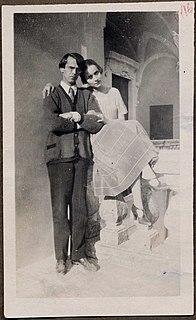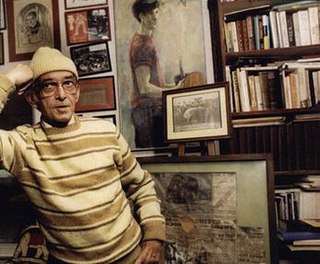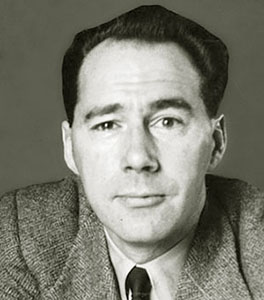A Quote by Marcel Proust
The bonds between ourselves and another person exists only in our minds. Memory as it grows fainter loosens them, and notwithstanding the illusion by which we want to be duped and which, out of love, friendship, politeness, deference, duty, we dupe other people, we exist alone. Man is the creature who cannot escape from himself, who knows other people only in himself, and when he asserts the contrary, he is lying.
Related Quotes
[On Paris:] It exists, constant, eternal, surrounding us who live in it, and it is in us. We love it or hate it, but we cannot escape it. It is a circle of associations in which man exists, being himself a circle of associations. Having entered it and come out of it we are not what we were before knowing it: it devoured us, we devoured it, and the problem is not did we or didn't we want it. We consumed each other. It courses in our blood.
Love is not something we give or get; it is something that we nurture and grow, a connection that can only be cultivated between two people when it exists within each one of them- we can only love others as much as we love ourselves. Shame, blame, disrespect, betrayal, and the withholding of affection damage the roots from which love grows. Love can only survive these injuries if they are acknowledged, healed, and rare.
Solitude is the profoundest fact of the human condition. Man is the only being who knows he is alone, and the only one who seeks out another. His nature - if that word can be used in reference to man, who has ‘invented’ himself by saying ‘no’ to nature - consists in his longing to realize himself in another. Man is nostalgia and a search for communion. Therefore, when he is aware of himself he is aware of his lack of another, that is, of his solitude.
Reason cannot desire for man any condition other than that in which not only every individual enjoys the most absolute, unbounded freedom to develop himself out of himself, in true individuality, but in which physical nature, as well, need receive no other shaping by human hands than that which is given to her voluntarily by each individual, according to the measure of his wants and his inclinations, restricted only by the limits of his energy and his rights.
To forgive another from the heart is an act of liberation. We set that person free from the negative bonds that exist between us. As long as we do not forgive we pull them with us, or worse, as a heavy load. The great temptation is to cling in anger to our enemies & then define ourselves as being offended & wounded by them. Forgiveness, therefore, liberates not only the other but also ourselves. It is the way to the freedom of the children of God.
Listening is a rare happening among human beings. You cannot listen to the word another is speaking if you are preoccupied with your appearance, or with impressing the other, or are trying to decide what you are going to say when the other stops talking, or are debating about whether what is being said is true or relevant or agreeable.
Such matters have their place, but only after listening to the word as the word is being uttered.
Listening is a primitive act of love in which a person gives himself to another’s word, making himself accessible and vulnerable to that word.
Philosophers have long conceded, however, that every man has two educators: 'that which is given to him, and the other that which he gives himself. Of the two kinds the latter is by far the more desirable. Indeed all that is most worthy in man he must work out and conquer for himself. It is that which constitutes our real and best nourishment. What we are merely taught seldom nourishes the mind like that which we teach ourselves.
The individual is defined only by his relationship to the world and to other individuals; he exists only by transcending himself, and his freedom can be achieved only through the freedom of others. He justifies his existence by a movement which, like freedom, springs from his heart but which leads outside of himself.
Man... knows only when he is satisfied and when he suffers, and only his sufferings and his satisfactions instruct him concerning himself, teach him what to seek and what to avoid. For the rest, man is a confused creature; he knows not whence he comes or whither he goes, he knows little of the world, and above all, he knows little of himself.
So you're in love with her?' she went on. A word again ... When the minds have learnt to mingle, when no thought is wholly one's own, and each has taken too much of the other ever to be entirely himself alone; when one has reached the beginning of seeing with a single eye, loving with a single heart, enjoying with a single joy; when there can be moments of identity and nothing is separate save bodies that long for one another ... When there is that, where is the word? There is only the inadequacy of the word that exists. 'We love one another,' I said.
If love exists between two persons, it is blessed. If love does not exist between two persons, then all your laws put together cannot bridge them. Then they exist separate, then they exist apart, then they exist in conflict, then they exist always in war. And they create all kinds of trouble for each other. They are nasty to each other, nagging to each other, possessive of each other, violent, oppressive, dominating, dictatorial.
An artist is he who has his center within himself. He who lacks this must choose a particular leader and mediator outside of himself, not forever, however, but only at first. For man cannot exist without a living center, and if he does not have it within himself, he may seek it only in a human being. Only a human being and his center can stimulate and awaken that of another.





































